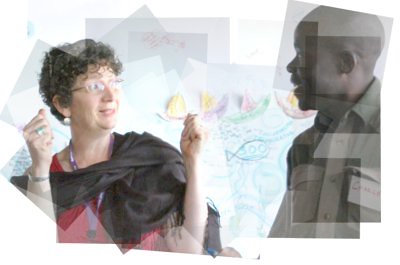This is a reblog of a guest blog post I did on Darren Sidnick’s Learning & Technology Blog: What the heck is a Domain and why should I care? (CoP with Nancy White). I’m republishing them here with Darren’s blessing! Part 1, part 2, part 3, part 4, part 5, part 6, part 7 , part 8 , part 9 and part 1o are all here on the blog.
What the heck is a Domain and why should I care?
 In the first in our series on communities of practice, (CoPs) I briefly mentioned Community, Domain and Practice. In this blog post I want to dive a little deeper into Domain. Because Etienne Wenger does such a great job of defining domain (and he really helped me understand it) I’ll start with his definition, and use his definitions later for Community and Practice as well:
In the first in our series on communities of practice, (CoPs) I briefly mentioned Community, Domain and Practice. In this blog post I want to dive a little deeper into Domain. Because Etienne Wenger does such a great job of defining domain (and he really helped me understand it) I’ll start with his definition, and use his definitions later for Community and Practice as well:
The domain: from http://www.ewenger.com/theory/
A community of practice is not merely a club of friends or a network of connections between people. It has an identity defined by a shared domain of interest. Membership therefore implies a commitment to the domain, and therefore a shared competence that distinguishes members from other people. (You could belong to the same network as someone and never know it.) The domain is not necessarily something recognized as “expertise” outside the community. A youth gang may have developed all sorts of ways of dealing with their domain: surviving on the street and maintaining some kind of identity they can live with. They value their collective competence and learn from each other, even though few people outside the group may value or even recognize their expertise.
So Domain is what we care about together. It is what is important enough for us to make time to participate, to learn these crazy online tools if that’s how our community connects, and makes us prioritize it over the many other things we have in our busy lives. So it has to matter! So if a learner is taking a course because they “have to”, we need to think carefully about if a community is the right approach.
Domain is not static
Domain is also one of those things that seems obvious at first — we are interested in learning about how to become entrepreneurs — but ends up being a bit more subtle. In large communities, there may be a big, overarching domain, with smaller, more specialized subgroups. In some communities, the domain may be relevant for only a short period of time and then the community naturally comes to the end of it’s life. The domain may shift when new people join or initial core members leave. Not all domain’s are “eternal!” So the first lesson about Domain is that it is not static and it has to reflect and respond to the interests and needs of the member. So we might start a CoP on entrepreneurs coming out of a business course offering, but it may turn out that the core of the group is really interested in marketing for small businesses, or developing a horticulture business. Then you get to that “ignition” point where the interest and passion is sufficient to get the community going. That “commitment” that Etienne describes in his definition. Over time, the domain focus might shift again — and responding to that shift is critical for community sustainability.
Community and personal identity
Domain also has to do with something else important in communities of practice: identity. The domain gives the community as a whole an identity, and it also is part of the identity of individual “members.” Shawn Callahan from Anecdote often says a useful test of a domain is to be able to identify with it personally. So in a community of entrepreneurs, you would say, yes, I’m an entrepreneur. But it may have a lot more personal meaning if it was “yes, I’m own a small horticultural business” and thus the more specific domain has more meaning.
So if you are thinking about a communities of practice approach with your e-learners, ask yourself, what might be the domain of my community? Try it out on some of your learners. See what they tell you. If it resonates… keep going. If they look at you like you are crazy, keep refining your ideas about domain WITH them. Because after all, it will be THEIR community. If you do this little experiment, leave a comment here and share a story of what you learned!
Here is another story about domain: http://joitskehulsebosch.blogspot.com/2008/07/communities-of-practice-and-bulldozers.html
Flickr Photo Credit:
 Read the comments on this post Blog comments that make you say “wow!” | BlogHer (which of course, I found because Denise linked to me otherwise I would not have seen it because there are not enough hours in the day.) How do you feel about comments?
Read the comments on this post Blog comments that make you say “wow!” | BlogHer (which of course, I found because Denise linked to me otherwise I would not have seen it because there are not enough hours in the day.) How do you feel about comments?
 In the first in our series on communities of practice, (CoPs) I briefly
In the first in our series on communities of practice, (CoPs) I briefly  My friend Bronwyn Stuckey wrote a blog post this week that rang bells for me. She was essentially asking, how do we catch up when we are lost or left behind in an online learning course/class/workshop? This hit home because right now I’m facilitating a workshop and have totally fallen behind in two online courses I’m ostensibly “taking!” Ha!
My friend Bronwyn Stuckey wrote a blog post this week that rang bells for me. She was essentially asking, how do we catch up when we are lost or left behind in an online learning course/class/workshop? This hit home because right now I’m facilitating a workshop and have totally fallen behind in two online courses I’m ostensibly “taking!” Ha! Last week I was facing what many of our online learners must face – a guilt trip about not devoting enough time to a course and being overwhelmed by decisions. Do I try to catch it all up after being inattentive for a few weeks? Do I try and contact someone, perhaps a buddy, and try to get the abridged version of what has passed me by? If everyone else is keeping up why am I so inadequate? Do I just pick up from here and ignore or let slide what has passed me by? Or do I just give up because I feel too far behind?
Last week I was facing what many of our online learners must face – a guilt trip about not devoting enough time to a course and being overwhelmed by decisions. Do I try to catch it all up after being inattentive for a few weeks? Do I try and contact someone, perhaps a buddy, and try to get the abridged version of what has passed me by? If everyone else is keeping up why am I so inadequate? Do I just pick up from here and ignore or let slide what has passed me by? Or do I just give up because I feel too far behind? First, for those not familiar with term “phase change” in the context of a course, my interpretation is a phase change is when the group shifts from a focus or topic, shifts from one form of interaction to another (going from online to offline, for example, or shifting to using a different tool or modality.) Sometimes the shift makes us feel that there is no going back to previous phases, or that if you missed the previous phase, you were out of luck. Bron, is that your interpretation?
First, for those not familiar with term “phase change” in the context of a course, my interpretation is a phase change is when the group shifts from a focus or topic, shifts from one form of interaction to another (going from online to offline, for example, or shifting to using a different tool or modality.) Sometimes the shift makes us feel that there is no going back to previous phases, or that if you missed the previous phase, you were out of luck. Bron, is that your interpretation? If you are interested in knowledge management, knowledge sharing, collaboration and a passel of other topics, following
If you are interested in knowledge management, knowledge sharing, collaboration and a passel of other topics, following